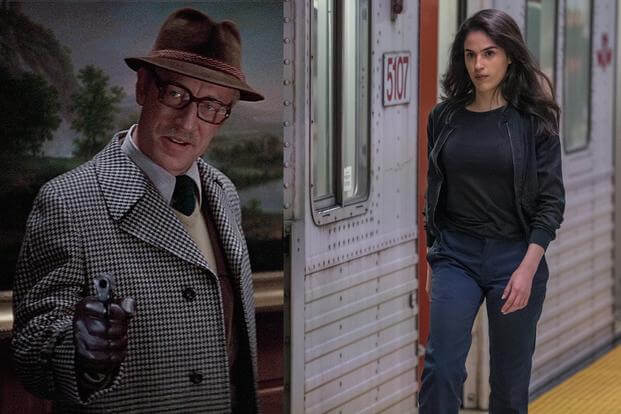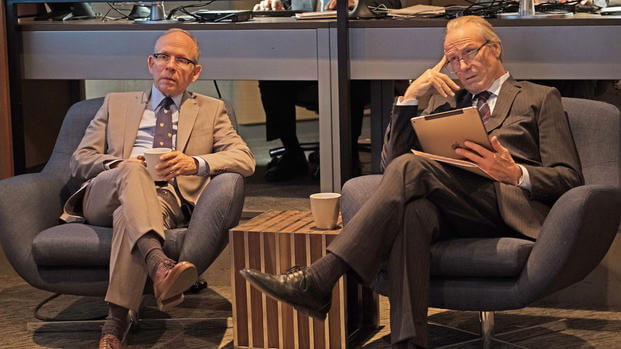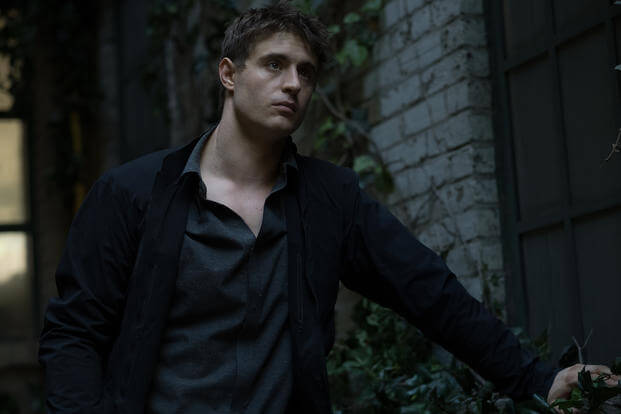"Condor" is a modern reimagining of James Grady's classic espionage novel "Six Days of the Condor," the book that inspired Sydney Pollack's even more classic 1975 movie "Three Days of the Condor."
The new series injects biological weapons and Islamic terror into the equation. Just like the movie, a lone CIA analyst has to unravel a vast shadow conspiracy after everyone else in his office is killed by a hit squad. It's a different conspiracy and the spies have access to entirely different technology than their 70s counterparts.
The series stars Max Irons with William Hurt, Leem Lubany Mira Sorvino and Bob Balaban. Brendan Fraser fans will be glad to know that he shows up as a sad-sack hitman in a part that's far better than the one he had to play in this year's FX series "Trust."
The ten-episode series airs new episodes Wednesday nights at 10pm ET/PT on the AT&T Audience Network, available on DIRECTV, AT&T U-verse and DIRECTV NOW and streaming on their respective apps. Episode two premieres on June 13th with the rest of the series airing over the next seven weeks.
Max Irons stars as Joe Turner and manages to echo Robert Redford's iconic performance while also taking the role in a more kickass direction. You may know Max from the 2011 movie "Red Riding Hood" or his starring role in the excellent 2017 Agatha Christie movie "Crooked House." "Condor" is his best role to date and he took a few minutes to talk with us about the series.
"Three Days of the Condor" is one of the iconic 70’s paranoid conspiracy movies. Is that a film you watched growing up? I know you're a little too young for that era.
I watched it, I think, when I was about 16, but I had no understanding of the political significance or the time that it came out, something I think adds to the value of the film at large.
Are you a fan of the espionage genre? What attracts you to a role like this one?
A lot of things attracted me to this particular role. But in answer to your first question, I absolutely am a fan of the espionage genre and I find the Cold War era very interesting. Particularly the militarily aspect, if I'm being honest.
In terms of this particular show, what interested me the most is how it asks a couple of questions of the audience. At the end of the movie there was a monologue, which you may or may not remember, which talked about how the American people are used to certain luxuries and they don’t really care how they get them, so long as they get them.
Joe Turner confronts Higgins in the movie "Three Days of the Condor": "What is it with you people?"
I think that’s very much still true today. For example, gasoline or season-round access to fruit and vegetables or cell phone technology. With cell phone technology, we are now becoming aware that, to a certain extent, we are giving away vast swaths of our privacy and civil liberties. Season-round vegetables, the use of aggressive carcinogenic pesticides, and just a steady flow of gasoline means a couple of questionable wars throughout the Middle East over the past 15, 20 years.
In the case of Condor, you're looking at national security and you're asking yourself the question, "What am I willing to tolerate in order to guarantee my safety? When I board a plane at LAX or JFK, what has gone into guaranteeing my safety?" And I think, you know like a lot of things, when people are given truthful information, they make different informed decisions. The production of meat is another example. When people discover how KFC produce their food, they make conscientious decisions to not eat that. I think that's what Condor does. The show begs questions of the audience and it doesn’t assume a position of right or wrong, good or evil. And I think that’s good.
I'm eight episodes in and to me it seems the core question of the series is what role the profit motive should be allowed to have when we're making security decisions.
The profit motive? Yeah, well, that’s a whole other kettle of fish. I have my position, but I imagine my position is probably quite uninformed. This comes down to rather complex politics. My personal position is that if we insist on living in such a way that we have three cars, two homes, constant access to cheap holidays, 15 TVs in our house and 7 laptops, there's gonna be a price to pay for that both militarily and economically. Whether that is truly for the betterment of a nation, that's a whole other question. I don’t know whether we have to accept that we need to perhaps live more within our means and be less imperialist abroad in order to guarantee the flow of certain luxury goods. That’s an individual decision and an individual point of principle.

Another thing that may surprise fans of the movie is that iconic characters like like Kathy or Joubert or even Sam don't turn out to be the people we'd expect from the film or the novel. Was that something you were all conscious of when making the show?
I think, like in many areas of the entertainment business, there was a concerted effort to diversify. Everyone in question contributes very well to this project, and not to its detriment at all. I think Leem Lubany playing Max von Sydow’s part is a perfect example. She's terrifying and menacing and relentless as can be.

It's interesting to see Oscar winners like William Hurt and Mira Sorvino finding better roles in television than they do in the movies. The business has changed and a lot of the best roles for ensembles seems to be in television instead of film.
Yeah, seemingly so. I mean, personally, as an actor, it’s a separate question. But as a viewer, I personally enjoy the long-form format. If it’s a good quality show, I like being able to explore the scenes and ideas and character development over the course of ten hours, as opposed to trying to jam it all in to two.
I don’t want to mention any films by name, but some of the larger franchise movies that are dominating the box office at the moment, they have enormously starry casts with 15 or 20 recognizable faces. And personally, as a result, I find that I have little emotional investment in any of them. Whereas television, you can tell a much greater, detailed story when you get into the characters and learn what they're about. That’s what inherently brings drama and makes the audience care.

Is this series a one-off, is this something that could continue into future seasons?
This is slightly above my paygrade, but I know the door has been left open for that. Even though you do get a satisfying conclusion at the end of season one, there are caveats left unaddressed that could lead to a season two and the show could go in various directions.
It's fascinating that the essential story structure of the spy genre has proved so adaptable. So much has changed in the world political situation and yet the essential questions and the beats of the story from the original novel still seem to work more than 40 years later.
Well, I think there's a similar theme at the heart of both the film and the TV show. There's the question of what motivates the government bodies acting on our behalf. Whether it be the CIA, whether it be the Republican or Democratic parties, whether it be the military or the military industrial complex as a whole. What is the public face of these decisions and what is the private face of these decisions? I think it’s important for the citizenry to constantly be focusing and holding to account these people who are supposedly acting in our best interest.





